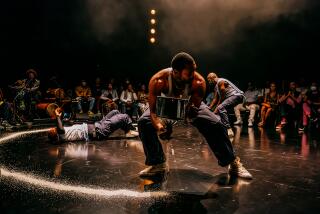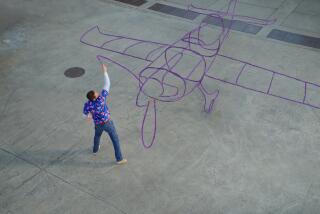Working Together in South Africa
At a South African tea room on a rainy afternoon in 1950, the ownersâ 17-year-old son and two black waiters are excitedly working out an idea. The boy has a cultural-history paper due at school, and he is pumping the men for information about the big ballroom dance competition for which they have been preparing whenever business is slow.
Grinning with a giddy sense of common purpose, the three of them embody the theme theyâre developing for the paper: a perfect world where people glide gracefully alongside each other without colliding.
It is a wonderfully evocative scene, and witnessing it again in International City Theatreâs vibrant revival of â âMaster Haroldâ ... and the boysâ prompts renewed appreciation for the power and poetry of Athol Fugardâs writing. The 1982 play, written before apartheidâs fall, also lays instructive groundwork for the South African playwrightâs new âSorrows and Rejoicings,â currently at the Mark Taper Forum in its West Coast premiere.
Fugard once explained in an interview that two people had profoundly influenced his writing about injustice and the dream of future healing. One was his mother, who âkept alive in me--when society was trying to blunt it--a sense of what is right and wrong.â
The other was Sam Semela, a black man who worked for Fugardâs family. Despite his affection for the man, Fugard had, when he was young, angrily spit in Semelaâs face. âI knew that it was ugly the moment I did it,â the playwright recalled. âWhat I began to understand--as the seconds and the days and the years passed--was how ugly and evil was an attitude of racial superiority that allowed you to do that with impunity.â
Sam is one of the waiters in â âMaster Haroldâ â; Fugard himself is the boy, Hally; and his mother, though unseen, calls with the news that speeds the play toward its shattering climax.
The performances in the International City production are as eloquent as Fugardâs writing. As Sam, Leon Morenzie stands tall, moves with grace and speaks with crisp wit and insight. No wonder Travis Vadenâs Hally adores him, his eyes narrowing with pleasure every time Sam lobs him an intellectual challenge. As Willie, the other waiter, Gregg Daniel watches and reacts to Hally and Samâs interactions--a sort of theatrical stand-in for South Africa itself.
Don Llewellyn has designed a tea room that imaginatively combines realism and symbolism. Its symbolic touch is a giant kite that dips low over the room as the audience enters to take its seats, then, as the play begins, rises to become the ceiling.
The kite is central to another of the storyâs images: of a younger Hally and Sam laughing together as their rickety, handmade kite catches the wind and becomes âsomething alive,â as Hally remembers it, tugging âas if it wanted to be free.â It is Fugardâs vision of a South Africa where people work together to get dreams off the ground.
Under caryn morse desaiâs direction, the action flows along on waves of goodwill until Hally gets some bad news and explosively lashes out at a convenient and socially sanctioned target: Sam.
âSorrows and Rejoicingsâ provides a coda to this story. In it, a white woman and a black woman, representatives of their respective cultures in post-apartheid South Africa, struggle to reconcile with one another. Will they manage it? That is the question that Fugard now asks in his plays, but only the people of his homeland can write the ending.
*
â âMaster Haroldâ ... and the boys,â Center Theater, Long Beach Performing Arts Center, 300 E. Ocean Blvd., Long Beach. Thursdays-Saturdays, 8 p.m.; Sundays, 2 p.m. Ends July 14. $27-$35. (562) 436-4610. Running time: 1 hour, 30 minutes.
More to Read
The biggest entertainment stories
Get our big stories about Hollywood, film, television, music, arts, culture and more right in your inbox as soon as they publish.
You may occasionally receive promotional content from the Los Angeles Times.











